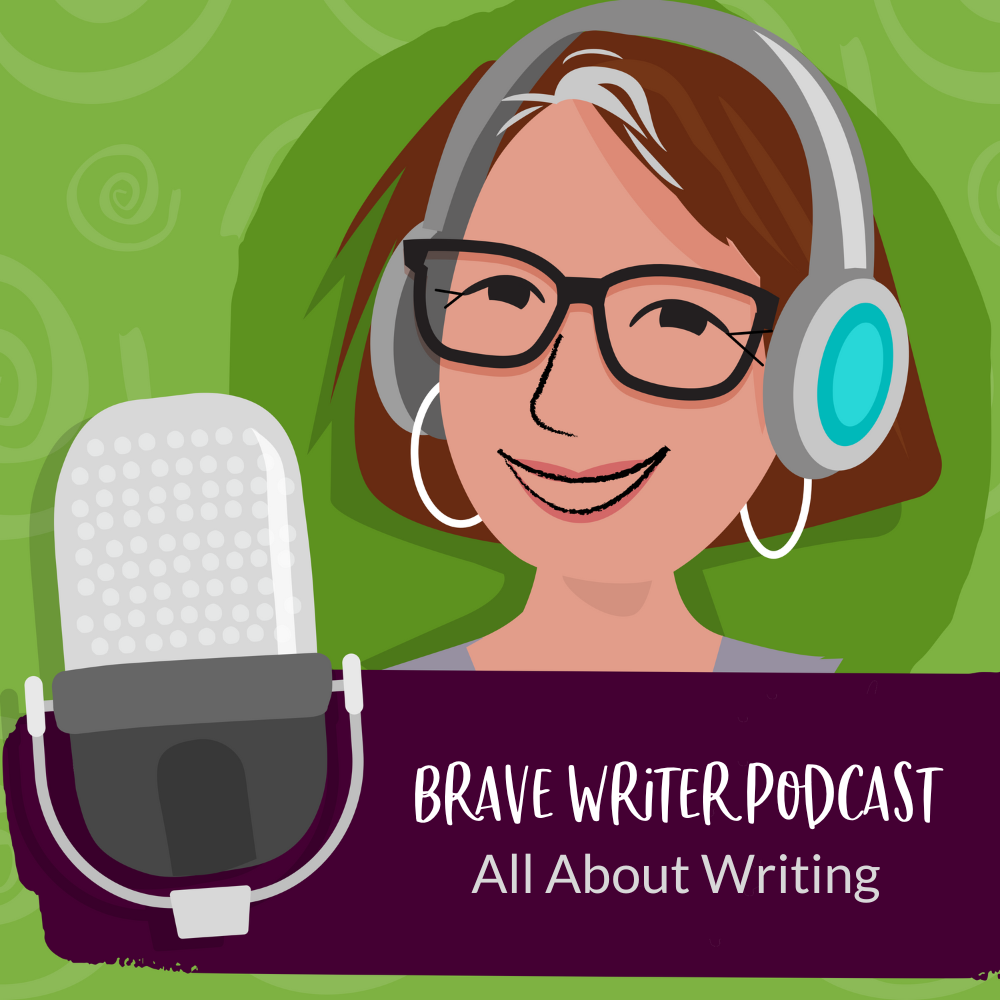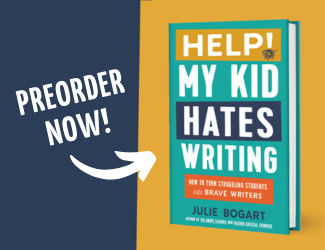Podcast: All About Writing

While the field of reading science is buzzing today with various theories, philosophies, and approaches, Brave Writer’s method stands out.
Let’s be clear, Brave Writer is not a reading program. We don’t teach phonics or whole language. We aren’t focused on reading instruction, but we do recognize that the ability to write effectively relies heavily on proficient reading skills.
Today’s podcast conversation goes beyond conventional methodologies. Figures like Thomas Jefferson learned to read without phonics, and so can your kids. We explore the essence of our Brave Writer programs.
Joining us is Melissa, our co-host, and Dawn Smith, the director of publications at Brave Writer, each bringing valuable insights from their respective realms of expertise.
Show Notes
The philosophy of Brave Writer
Our journey with Brave Writer began when we recognized that a significant number of children struggled with the transition from reading to writing. The common complaints from kids ranged from not having anything to write about to physical discomfort. This challenge prompted us to look beyond traditional writing programs and tap into self-expression and reader engagement.
Our approach prioritizes the individual voice of each student as something sacred. While we do offer support for traditional foundational skills like phonics and handwriting, we never sacrifice the development of each student’s unique expression. This emphasis on meaningful self-expression is how Brave Writer seeks to inspire children to write.
Capturing interest first
Our approach to creating educational content focuses on sparking interest first and achieving academic objectives second. To engage the student, we use:
- captivating narratives,
- interesting language,
- and playful elements.
For instance, in our DART program, we use a novel read aloud and pick four passages to study throughout the month. We prioritize delightful passages and fun wordplay over rigid grammar and punctuation rules. By keeping our approach lively and playful, we ensure that the learning process remains enjoyable for the child.
Embodying language
At Brave Writer, we encourage students to go beyond simply learning about grammatical constructs and instead focus on meeting and becoming familiar with them. We even employ physical activities to ensure children embody the concepts they are learning.
Our goal is to enable children to form friendships with concepts like prepositions and verbs, not just recognize them.
Writing is more than words on a page
Brave Writer places a strong emphasis on critical thinking. Writing is not just about functional literacy or self-expression; it’s also a tool to engage the world, generate insights, ideas, and construct a valuable worldview. It allows us to examine our thoughts and beliefs in the process of translating them into written words.
One of our students’ testimonies beautifully encapsulates this perspective. His mother wrote to us:
“I’m sharing this with you and your staff because I feel like this is our win, yours and mine. You already know the long-term impact of Brave Writer pedagogy, but I thought I would tell you about my mind-blowing day yesterday. We have a beautiful, gentle 16-year-old who has some developmental delays and was bullied and and pulled from school. The Brave Writer lifestyle enabled him to travel through his education, believing he was amazing. Each milestone celebrated, rich language introduced, and big juicy conversations presented in ways he could understand. He took many of your online classes and received nothing but encouragement, positive feedback, and more celebrations from your staff. He’s now in college. Yesterday, he was writing about the long-term political impacts of the Treaty of Westphalia, and I couldn’t get my head around the treaty. And he turned to me and said, ‘Let me explain this to you in a way you will understand. Think of the Thirty-Year War as the Galactic Civil War, and of France, Sweden, and German princes as the rebel alliance. They considered the Catholic Church as Darth Sidious because they thought it was secretly trying to create a world monarchy that would remove the heads of state. Then you need to consider the Holy Roman Empire as Darth Vader, who ends up on a redemption arc. It was closely aligned with the Catholic Church, but then ended up being the biggest advocate for introducing and implementing a palatable treaty to end the war.’ This is what he learned in Brave Writer, to interpolate, to present information in a format someone could understand, to use appropriate, respectful language, to love, love, love reading, and most of all, believe in himself. All the games, parties, celebrations, challenges, and thinking outside the box for solutions were worth it.”
To me, that encapsulates what we want to accomplish with every child. It’s that level of empowerment.
Brave Writer believes that every child has the potential to articulate their thoughts in a way that is both meaningful and engaging. It is through this prism that we view the journey of teaching writing, and we couldn’t be more excited about the amazing transformations it can produce.
Resources
- Start a free trial of CTCmath.com to try the math program that’s sure to grab and keep your child’s attention!
- Shop for our popular Quill, Dart, Arrow, Boomerang and Slingshot programs in June for the lowest price of the year!
- Join our Jumpstart Webinars in June with Julie: blog.bravewriter.com/jumpstart
- Sign up for our Text Message Pod Ring to get podcast updates and more!
- Send us podcast topic ideas by texting us: +1 (833) 947-3684
- Want help getting started with Brave Writer? Go to bravewriter.com/getting-started
- Sign up for the Brave Writer newsletter to learn about all of the special offers we’re doing in 2022 and you’ll get a free seven-day Writing Blitz guide just for signing up: https://go.bravewriter.com/writing-blitz
Connect with Julie
- Instagram: instagram.com/juliebravewriter
- Twitter: twitter.com/bravewriter
- Facebook: facebook.com/bravewriter


















